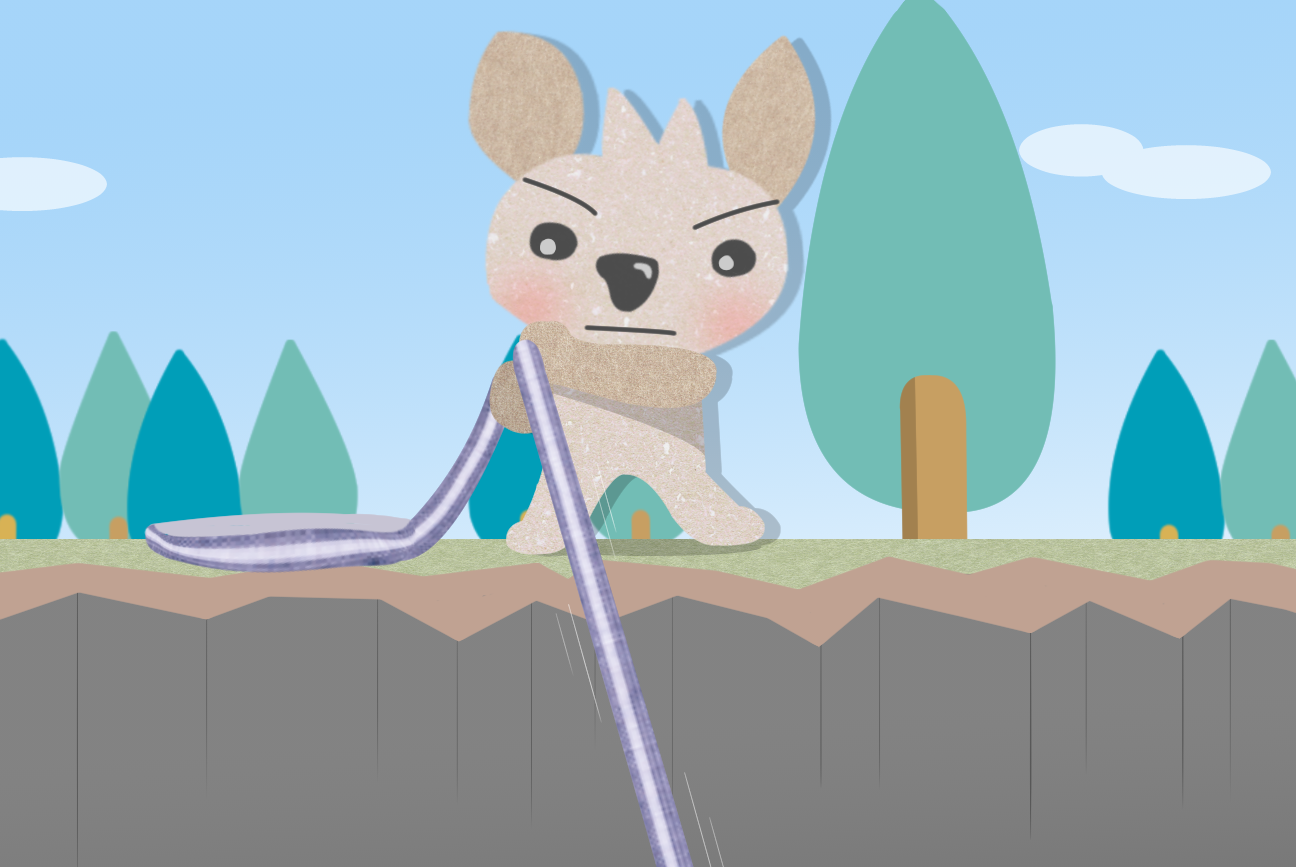ペラペラ英語飯62「魚がロープを咥えることができたので、釣り上げようとする。」
(前回までのあらすじ)ピットは崖の下で溺れかけているの魚を助けるためにロープを垂らしましたが、ロープが回転して魚が口でキャッチすることができません。ピットはイライラしてクシャミをしました。
The orbit of rotation of the rope changed due to the reaction of the sneeze, and the rope hit the face of the fish. The fish caught the rope with his mouth not to miss this chance.
Pit said, “Good job! I’ll pull up the rope from now, so you hold on to it!"
Though he tried to lift the fish by pulling up the rope vertically, the rope only stretched and shrank, and the stick piercing in his back fin was unlikely to come off. He tried to pull the fish to left diagonally and right diagonally alternately, but the situation did not change.
Pit said, “Damn it!"
英語専門家 IDIY LILY チェック
解説
The orbit of rotation of the ropechanged due to the reaction of the sneeze, and the ropehitthe face of the fish.
訳「くしゃみの反動でロープの回転の軌道が変化し、ロープが魚の顔に当たりました。」
この文は等位接続詞のandを使って以下の2つの文を繋いでいます。
⇒「等位接続詞andとは」
(1)The orbit of rotation of the rope changed due to the reaction of the sneeze.
(2)The rope hit the face of the fish.
due to~は「~の理由から」という意味です。
⇒「due toについてもう少し詳しく」
hitの活用は変化しないので注意して下さい。
| 現在形 | 過去形 | 過去分詞 |
|---|---|---|
| hit | hit | hit |
The fishcaughtthe rope with his mouth not to miss this chance.
訳「魚はこのチャンスを逃すまいと、すかさずロープを咥えました。」
不定詞を使った副詞句が主節を補足しています。
⇒「不定詞の副詞用法とは」
catchの活用に注意して下さい。
| 現在形 | 過去形 | 過去分詞 |
|---|---|---|
| catch | caught | caught |
Pit said, “Good job!
ピット「よくやった!」
聞き手を褒めるときによく使う言葉です。他に以下の言い方もあります。
| 意味 | 英文 |
|---|---|
| よくやった | Great job! |
| You did a good job! | |
| You did an excellent job! |
I'll pull upthe rope from now, so youhold on toit!"
ピット「これからロープを引っ張るから、つかんでいるんだよ!」
この文は等位接続詞のsoを使って以下の2つの文を原因(ロープを引っ張る)⇒結果(ロープを離さないでね)の流れでつないでいます。
⇒「等位接続詞soとは」
(A)I’ll pull up the rope from now.
(B)You hold on to it!
pull up~は「~を引き上げる」という意味です。
hold on to~は「~につかまる」という意味です。
Though he tried to lift the fish by pulling up the rope vertically, the rope only stretched and shrank, and the stick piercing in his back finwasunlikely to come off.
「彼は魚を縦方向に引っ張って釣り上げようとしましたが、ロープが伸び縮みするだけで魚の背びれは木から外れそうもありません。」
従位接続詞のthough「~にもかかわらず」を使った副詞節が主節を補足しています。
⇒「従位接続詞thoughとは」
等位接続詞のandを使って以下の2つの文を繋いでいます。
⇒「等位接続詞andとは」
(A)The rope only stretched and shrank.
(B)The stick piercing in his back fin was unlikely to come off
Bの文では現在分詞を使った形容詞句(piercing in his back fin)がstickを修飾しています。
⇒「現在分詞とは」
unlikelyは補語として使われるとき、後ろにto不定詞やthat節のカタマリを置き「~しそうもない」という意味になります。
shrink(縮む)の活用に注意して下さい。
| 現在形 | 過去形 | 過去分詞 |
|---|---|---|
| shrink | shrank shrunk | shrunk shrunken |
Hetriedto pull the fish to left diagonally and right diagonally alternately, but the situationdid not change.
訳「彼は魚を左斜め、右斜め交互に引っ張ってみましたが、変わりません。」
等位接続詞のbutを使って以下の2つの文を逆接でつないでいます。
⇒「等位接続詞butとは」
(A)He tried to pull the fish to left diagonally and right diagonally alternately.
(B)The situation did not change.
Aの文では不定詞を使った名詞句が目的語になっています。
⇒「不定詞とは」
Pit said, “Damn it!"
ピット「くそ!」
ちきしょう!、くそっ!、しまった!を表現するときの決まり文句です。
全文訳
くしゃみの反動でロープの回転の軌道が変化し、ロープが魚の顔に当たりました。魚はこのチャンスを逃すまいと、すかさずロープを咥えました。
ピット「よくやった!これからロープを引っ張るから、つかんでいるんだよ!」
彼は魚を縦方向に引っ張って釣り上げようとしましたが、ロープが伸び縮みするだけで魚の背びれは木から外れそうもありません。
彼は魚を左斜め、右斜め交互に引っ張ってみましたが、変わりません。
ピット「くそ!」
英語飯チェック
| 語句 | 意味 |
|---|---|
| orbit | 軌道 |
| rotation | 回転 |
| rope | ロープ |
| change | 変わる |
| due to~ | ~のため |
| reaction | 反動 |
| sneeze | クシャミ |
| hit | 打つ |
| mouth | 口 |
| miss | 逃す |
| chance | チャンス |
| Good job | よくやった |
| pull up~ | ~を引き上げる |
| hold on to~ | ~につかまる |
| lift | 持ち上げる |
| vertically | 鉛直方向に |
| stretch | 伸びる |
| shrink | 縮む |
| pierce | 貫く |
| come off | 外れる |
| try | やってみる |
| diagonally | 斜めに |
| alternately | 交互に |
| situation | 状況 |
| Damn it! | くそ! |
